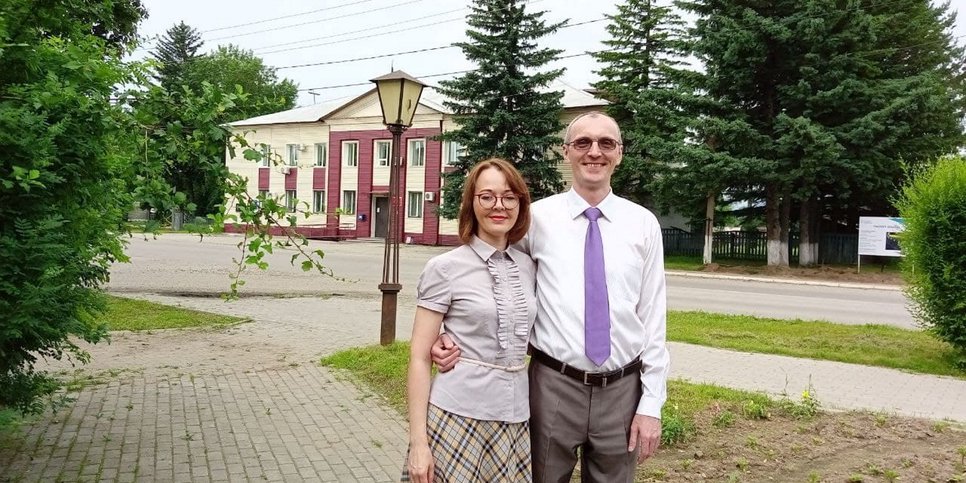Konstantin Moiseyenko with his wife, Margarita, near the court
Konstantin Moiseyenko with his wife, Margarita, near the court
The Verdict Announced to One More of Jehovah's Witnesses in the Amur Region. Konstantin Moiseyenko From the City of Zeya Was Given a Six-Year Suspended Sentence for His Faith
Amur RegionOn July 14, 2021, the judge of the Zeysky District Court of the Amur Region, Alexander Kozlov, sentenced 45-year-old IT engineer Konstantin Moiseyenko to 6 years probation suspended sentence on charges of organizing extremist activities. The verdict has not entered into force and can be appealed. The believer insists on his complete innocence.
Although there is not a single victim in the case, state prosecutor Erika Schechtel asked the court to sentence the believer to 6 years in prison in a penal colony.
On March 21, 2019, in Zeya, searches were carried out in Zeya in the home of Konstantin Moiseyenko and several other believers. 10 days before that, V.S. Obukhov, an investigator of the FSB of Russia for the Amur Region, opened a criminal case against Konstantin for his faith under Part 1 of Art. 282.2 of the Criminal Code of the Russian Federation. The investigation lasted 16 months. On August 31, 2020, the case of Konstantin Moiseyenko was received by the Zeysky District Court of the Amur Region. At the time the case was submitted to the court, it consisted of 11 volumes.
The charge relied on video recordings of the services received by an embedded FSB agent. The woman showing an interest in the Bible was provided with special equipment for audio and video recordings.
Also involved in the case was Olga Averina, an expert, associate professor of the Department of Philosophy of the Far Eastern Institute of Management, who, contrary to the official statements of the Russian authorities that Jehovah's Witnesses have the right to practice their religion in groups, stated in her expert opinion: “The very fact of holding meetings of followers of the religious organization Jehovah's Witnesses” is a confirmation of the continued activities of the [banned] organization. ”In fact, the RF Supreme Court did not prohibit practicing the religion of Jehovah's Witnesses.
Konstantin Moiseyenko explained that Jehovah's Witnesses come to church services voluntarily out of a desire to worship God, and the very presence at church meetings is not a crime or a threat to the security of the state, as the investigation argued: “Why [the investigator] came to this conclusion is completely incomprehensible .. My only intention was to worship God. " Speaking with the last word, the believer asked the court: “When sentencing, please explain how I can be Jehovah's Witness, how I can keep God's commandments set forth in the Bible so that I do not face the penalty of imprisonment for a period of 6 to 10 years under Article 282.2 of the Criminal Code of the Russian Federation ”. He added: “More than 20 years ago, I made a choice and made a decision — to devote my life to fulfilling the will of God. Promises must be kept. Therefore, I firmly intend to continue to adhere to the decision made. I don't want to give up my beliefs. On the contrary, I want to remain loyal to Jehovah God. Devotion is not 90%, not 95%, but 100%. "
Moiseyenko spent about 2 years and 4 months under recognizance agreement. The court hearings lasted over 10 months.
A criminal case against the believer was initiated simultaneously with another case against another inhabitant of Zeya —78-year-old Vasiliy Reznichenko, a USSR labor veteran. He has already received a suspended sentence of 2 years. At the end of June 2021, two other believers from the Amur Region were sentenced to unprecedentedly high sentences: Alexey Berchuk and Dmitriy Golik received 8 and 7 years in prison, respectively. Only 15 believers in the region faced criminal prosecution simply because of their faith in Jehovah God.
As in the case of other Jehovah's Witnesses in Russia, the criminal case against Konstantin Moiseyenko was initiated only because he did not renounce his religion. Even the prosecution witnesses were unable to confirm the facts of any unlawful actions of the believer. For example, FSB officer Korendov admitted that Jehovah's Witnesses are known to him for not resorting to violence in resolving conflicts and adhering to high moral standards. The videos presented in the court only confirmed the peaceful nature of the religious meetings of believers.
According to Alexander Verkhovskiy, head of the “Sova” information and analytical center and member of the Presidential Council for the Development of Civil Society and Human Rights, the logic of the sentences handed down to Jehovah's Witnesses in different regions is impossible to understand. “Probably not a single campaign of persecution has been unfolded at such a rate recently. Now the punishments are gradually getting tougher,— he noted.— The ban of Jehovah's Witnesses is, in fact, illegal, because it is based on the fact that they ... assert the superiority of their faith ... But this is such a generally accepted opinion among believers that it is their faith is the truest, which is not clear how anyone at all came to persecute for this. "

